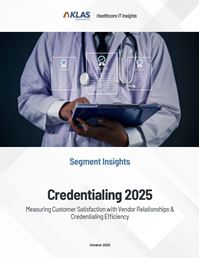 2026 BEST IN KLAS
2026 BEST IN KLAS
Preferences
Related Series
Related Segments


Credentialing 2020
Who is Meeting Emergent Provider Needs During COVID-19?
Quick, effective credentialing solutions have never been more critical for provider organizations than during the COVID-19 crisis. This report examines how well credentialing solutions are addressing the following top-of-mind market challenges: remote credentialing approval, urgent and emergency approvals, telehealth credentialing, and out-of-state credentialing. It also shares which vendors are providing strong value and customer partnership.
Some of the vendors in this space take different approaches to credentialing or serve different segments of the market (e.g., Verge Health offers primarily services; Modio Health and Silversheet serve mostly ambulatory organizations). However, all share the same goal: to enable and support provider organizations’ credentialing processes.
Verge Health’s Remote Credentialing Capabilities Outpace the Market

Verge Health, Modio, ASM MD-Staff Consistently Meet or Exceed Expectations for Emergency Credentialing

symplr Cactus and VerityStream Echo Fail to Deliver the Expected Value
Over half of symplr Cactus customers report nickel-and-diming and feel the vendor lags in driving tangible outcomes. symplr’s à la carte sales approach results in customers not buying all they need to be successful (e.g., customers who don’t purchase the module for electronically filling out documents must use email, printing, and faxing). Fees associated with both provider-requested system tweaks and vendor-driven changes make the latest functionality cost-prohibitive, limiting the outcomes customers achieve. Customers say the system drives outcomes in the form of automated processes, but they don’t report measurable efficiency gains or other benefits. Furthermore, those on the newer web version say they have not received the training to fully leverage it. IntelliSoft, acquired by symplr in 2019, generally meets customer expectations and has a high degree of customer loyalty thanks to consistency in keeping promises. Nickel-and-diming and less hands-on guidance from the vendor hurt overall value and hinder notable outcomes.
VerityStream offers three platforms: Echo and MSOW (both legacy platforms, though they will continue to be supported) and the new CredentialStream platform (too early to measure). MSOW users report nickel-and-diming more frequently than any other measured customer base. Unexpected costs are associated with things customers feel should be included, like training and time spent on implementation. Additionally, a poor fee structure can lead to unexpected charges. Respondents note that if organizations are specific and aggressive during contracting, they can get the fee structure to a better state. Because of the cost, some customers are not taking full advantage of available functionality, thus hurting outcomes. MSOW’s reports are seen as useful and on pace with the market, adding value; respondents note that reports require a lot of knowledge to build.

Verge Health and Modio Seen as Strong Go-Forward Partners

Almost All Vendors Provide Strong Telehealth Credentialing That Meets Customers’ Needs
While telehealth credentialing is a critical capability during COVID-19, almost any vendor can deliver a positive experience with telehealth credentialing. ASM MD-Staff, Modio, Silversheet (limited data), Verge, and VerityStream Echo all consistently meet or exceed client expectations in this area. Respondents cite quick turnaround times and effective management of credentialing by proxy. Customers of IntelliSoft, acquired by symplr in 2019, say tools for telehealth credentialing meet their needs, though they don’t exceed expectations.
Respondents using VerityStream MSOW or symplr Cactus are most likely to report challenges with telehealth credentialing. These concerns are not tied to telehealth specifically, but rather mirror customers’ general concerns. VerityStream MSOW clients have a similar experience with telehealth as they do with standard credentialing, with cost challenges and a lack of hands-on guidance limiting satisfaction. symplr Cactus clients feel the credentialing process is not as effective as they need because of poor system usability, complicated workflows, and lack of strategic guidance from symplr. Some customers say the solution might be better suited to telehealth credentialing than they are aware of, but because of nickel-and-diming practices, they are not using all available functionality.

Credentialing Vendors’ Overall Performance
This report focuses on specific, top-of-mind credentialing needs. KLAS also collects ongoing customer ratings in more general customer satisfaction areas, including culture, loyalty, operations, product, and relationship. The chart to the right shows the overall performance scores of the vendors measured in this report. For more on these vendors, visit the KLAS website.

About This Report
Each year, KLAS interviews thousands of healthcare professionals about the IT products and services their organizations use. These interviews are conducted using a standard quantitative evaluation, and the scores and commentary collected are shared in reports like this one and online in real time so that other providers and IT professionals can benefit from their peers’ experiences.

To supplement the data gathered with this standard evaluation, KLAS also creates various supplemental evaluations that target a subset of KLAS’ overall sampling and delve deeper into the most pressing questions facing healthcare technology today.
The data in this report comes from both evaluation types and was collected over the last 12 months; the number of unique responding organizations for each is given in the chart below.
What Does “Limited Data” Mean?
Some products are used in only a small number of facilities, some vendors are resistant to providing client lists, and some respondents choose not to answer particular questions. Thus a vendor’s sample size may vary from question to question and may not reach KLAS’ required threshold of 15 unique respondents. When a vendor’s sample size for a particular question is less than 15, the score for that question is marked with an asterisk (*) or otherwise designated as “limited data.” If the sample size is less than 6, no score is shown. Note that when a vendor has a low number of reporting sites, the possibility exists for KLAS scores to change significantly as new surveys are collected.
Overall scores are measured on a 100-point scale and represent the weighted average of several yes/no questions as well as other questions scored on a 9-point scale.

Product Designations Used in This Report
- Mostly Ambulatory [A]: Product for which the majority of respondents are associated with ambulatory care.
- Primarily Services [S]: Offering that consists primarily of services rather than software.

Writer
Amanda Wind

Designer
Jess Wallace-Simpson

Project Manager
Robert Ellis
This material is copyrighted. Any organization gaining unauthorized access to this report will be liable to compensate KLAS for the full retail price. Please see the KLAS DATA USE POLICY for information regarding use of this report. © 2026 KLAS Research, LLC. All Rights Reserved. NOTE: Performance scores may change significantly when including newly interviewed provider organizations, especially when added to a smaller sample size like in emerging markets with a small number of live clients. The findings presented are not meant to be conclusive data for an entire client base.






